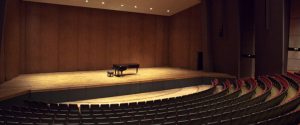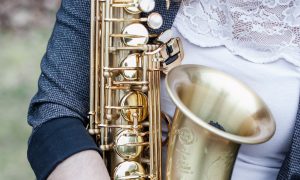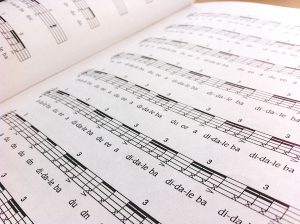"The effect of synesthetic metaphor on music students in secondary instrumental ensembles."
In this paper, I invite readers to take a glimpse into my own world in which Thursdays are green, the letter "F" is purple, and the A-flat major scale is yellow. This paper discusses this neurological condition called "synesthesia," where stimulation of one sensory or cognitive pathway leads to another. In this proposal for research, I provide an in-depth literature review that explains the possibility of synesthetic experiences being developed through interactions with one's environment. Further, my proposal for a quantitative research method seeks to discover whether or not music educators can elicit synesthetic experiences within their classrooms by using synesthetic metaphor to foster creativity, increase musical memorization, and enhance aesthetic awareness in their students.
"It takes a village: An examination of how multiple environments interact to manipulate music performance anxiety."
In this clinical paper, I discuss the ways in which family environments, formal music instruction climates, social settings, and personal perspectives can shape the way in which musicians experience music performance anxiety. Further, I discuss how specific types of support in each of these environments can foster musical growth and help to avoid or remediate performance anxiety. The purpose of this clinical paper is to help music educators figure out how to reach out to these multiple environments to ease the severity or existence of music performance anxiety within their students.
"A holistic perspective of peer assessment implementation in a music performance class."
In this explanatory case study, I examined a strong example of a tertiary performance-based music class which successfully uses peer-assessment practices on a weekly basis. To accurately link peer assessment implementation with subsequent effects, I interviewed both the teacher and the students of this class in order to gain a holistic view of the perceptions about the system that they currently have in place. My guiding questions were:
- What contributes to the successful implementation of peer assessments in the music classroom?
- What are the perceived benefits for both the teacher and the students of using peer assessment in the classroom?
- How do students feel about giving and receiving peer feedback?
- How do peer assessments affect classroom climate?
- How do peer assessments affect student motivation and sense of self?
"If you can't sing it, you can't play it; Vocalizing in instrumental ensembles."
In this clinical paper, I synthesize current research in the psychological and physiological processes involved in vocalization strategies among instrumental musicians, and explore its potential implications for instructional techniques to be used by instrumental music teachers. Further, this paper explores the barriers and potential issues surrounding this topic, while posing suggested solutions for music educators who might use to use this technique within their classrooms.



